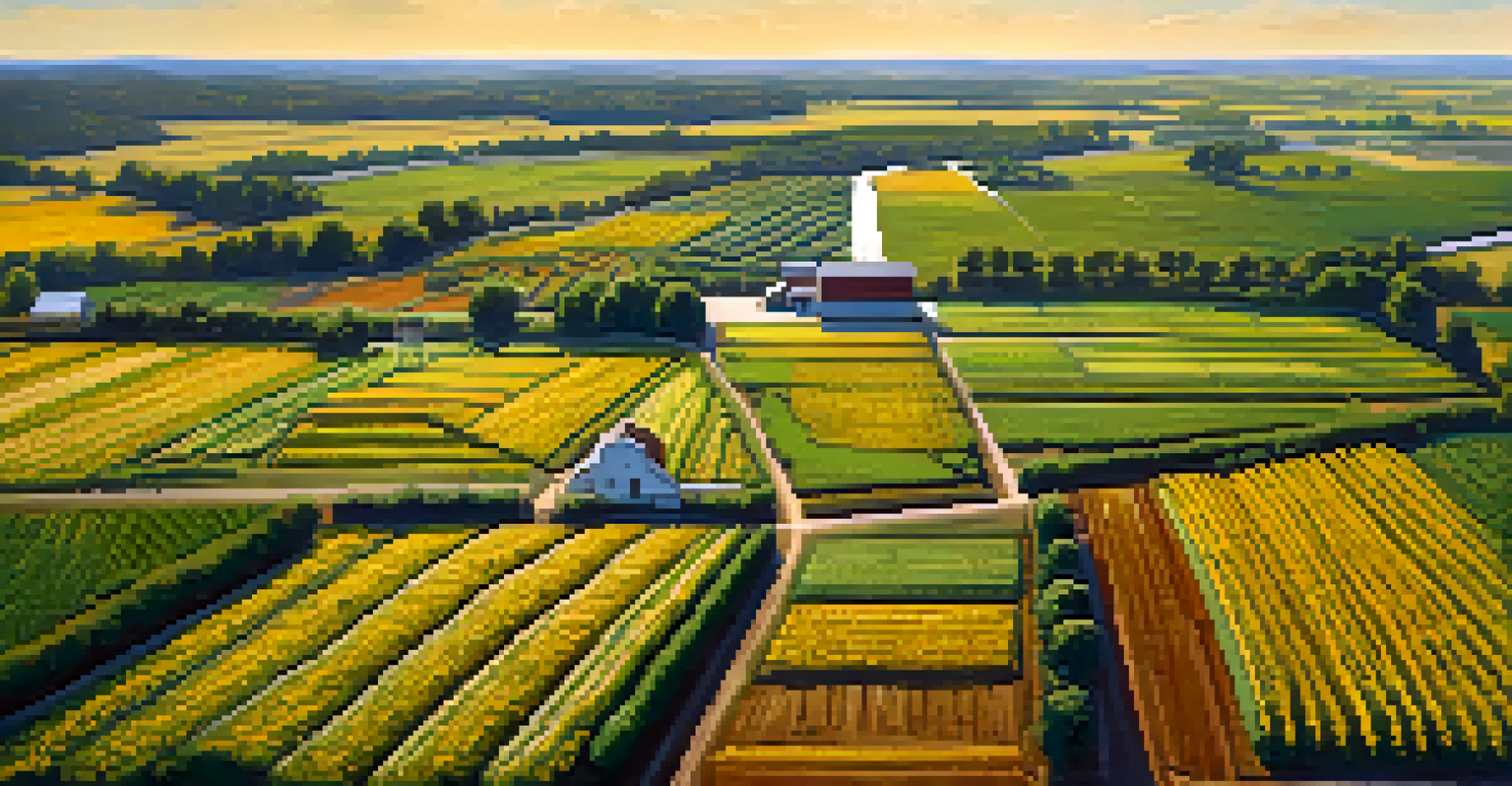The Impact of Climate Change on Georgia's Agriculture

Introduction to Climate Change and Agriculture in Georgia
Georgia's agriculture is a vital part of its economy, contributing billions annually. However, climate change poses significant challenges to this sector. As weather patterns shift and extreme conditions become more frequent, farmers must adapt to survive. Understanding these changes is crucial for ensuring the sustainability of Georgia's agricultural practices.
Climate change is not a distant threat. It is the reality we face today, and we must adapt our agricultural practices to survive.
In recent years, farmers have reported unusual weather events, from unexpected droughts to heavy rainfall. These changes not only impact crop yields but also threaten livestock health and overall farm productivity. For instance, peach orchards, a staple in Georgia, have seen production fluctuations that can be attributed to rising temperatures and erratic weather. This unpredictability makes planning for the future increasingly difficult.
Moreover, the implications of climate change extend beyond immediate agricultural challenges. Economic stability, food security, and rural livelihoods are all at stake. As we delve deeper into the specifics of how climate change affects Georgia's agricultural landscape, it's essential to consider both the current impacts and the long-term strategies for adaptation.
Shifts in Weather Patterns Affect Crop Production
Weather patterns in Georgia have become increasingly erratic, affecting the state's diverse crops. For example, cotton, a major cash crop, thrives in stable conditions; however, unexpected rainfall can lead to poor harvesting conditions. Farmers now face the reality of adjusting planting schedules and crop varieties to cope with these changes, which can be both cost-intensive and risky.

Additionally, pests and diseases thrive in warmer conditions, posing further challenges to crop health. As temperatures rise, farmers must invest more in pest management strategies to protect their yields. This increased reliance on pesticides can have environmental implications, affecting soil health and water quality, which are crucial for sustainable farming.
Climate Change Impacts Agriculture
Georgia's farmers face significant challenges due to unpredictable weather patterns that threaten crop yields and livestock health.
Farmers are not just reacting to immediate weather changes; they are also considering long-term trends. For instance, many are exploring drought-resistant crop varieties or innovative irrigation techniques to mitigate the effects of water scarcity. These proactive measures are essential for maintaining productivity in the face of climate challenges.
Impact of Rising Temperatures on Livestock
Rising temperatures also take a toll on livestock in Georgia, affecting their health and productivity. Livestock are sensitive to heat stress, which can lead to decreased milk production and lower fertility rates. Farmers are now grappling with how to keep their animals comfortable and healthy during scorching summer months.
The greatest threat to our planet is the belief that someone else will save it.
To combat heat stress, many farmers are implementing strategies such as providing shaded areas and ensuring ample access to water. However, these adaptations require additional resources and planning, further straining agricultural operations. Additionally, some farmers are exploring alternative breeds that are more heat-resistant, which may also require a learning curve and investment.
Moreover, the economic impact of livestock health issues cannot be overlooked. Reduced productivity translates to lower income for farmers, which can ripple through the local economy. This underscores the importance of addressing climate change proactively to safeguard both livestock welfare and farmers' livelihoods.
Water Scarcity and Its Effects on Agriculture
Water scarcity is becoming a pressing concern for Georgia's agricultural sector as climate change alters precipitation patterns. Regions that once enjoyed reliable rainfall are now facing prolonged dry spells, putting stress on crops and irrigation systems. This shift in water availability forces farmers to rethink how they manage their water resources.
Many farmers are turning to more efficient irrigation methods, such as drip irrigation, to maximize water use. These systems can significantly reduce water waste, but the initial investment can be a barrier for some. Additionally, farmers must stay informed about water conservation practices and regulations, which can vary by region and change over time.
Water Scarcity Threatens Crops
Changing precipitation patterns are leading to water scarcity, forcing farmers to adopt more efficient irrigation practices.
The implications of water scarcity extend beyond immediate farming needs; they also affect the broader community. Water shortages can impact local ecosystems, fisheries, and even drinking water supplies. Therefore, tackling the issue of water scarcity in agriculture is crucial not just for farmers, but for the entire state.
Economic Challenges for Farmers Amid Climate Change
As climate change continues to impact agriculture, economic challenges are mounting for Georgia's farmers. Crop failures due to extreme weather events can lead to significant financial losses, making it difficult for farmers to sustain their operations. This economic instability can result in a ripple effect, affecting local economies and food supplies.
Moreover, the costs associated with adapting to climate change—such as investing in new technologies or altering farming practices—can be prohibitive for many. Smaller farms, in particular, may struggle to find the funds to implement necessary changes, potentially leading to consolidation in the industry. This could result in fewer farms and less diversity in agricultural practices across the state.
Farmers are also facing increased competition for resources, including water and arable land. As climate change puts pressure on these essential inputs, the economic landscape for agriculture will continue to evolve. Understanding these economic challenges is vital for developing effective support systems for farmers during this transition.
The Role of Technology in Agricultural Adaptation
Technology is proving to be a powerful ally for Georgia's farmers as they adapt to the realities of climate change. From precision agriculture to climate forecasting tools, innovations are helping farmers make informed decisions that enhance resilience. For instance, using data analytics, farmers can optimize planting schedules and irrigation practices, ensuring they use resources more efficiently.
Moreover, advancements in biotechnology are enabling the development of crops that are more resilient to changing weather patterns. These genetically modified organisms (GMOs) can withstand drought or resist pests, providing farmers with better options in an uncertain climate. However, the adoption of such technologies also raises questions about safety, ethics, and market acceptance.
Economic Strain on Farmers
The financial impact of climate change, including crop failures and adaptation costs, poses serious economic challenges for Georgia's agricultural sector.
Ultimately, embracing technology can play a crucial role in safeguarding Georgia's agricultural future. As farmers navigate the complexities of climate change, leveraging innovative solutions will be essential for maintaining productivity and sustainability in the industry.
Community Efforts and Policy Changes for Resilience
Addressing the impact of climate change on agriculture requires collective action from communities and policymakers alike. Local organizations are increasingly focusing on educating farmers about sustainable practices and climate adaptation strategies. These initiatives help build resilience within the agricultural sector, ensuring that farmers are equipped to face future challenges.
On a policy level, support for sustainable agriculture practices is gaining traction. Programs that incentivize conservation, research, and development of climate-resilient crops can provide a pathway for farmers to adapt effectively. Additionally, collaboration between state agencies and agricultural stakeholders is crucial for creating comprehensive strategies that address the multifaceted impacts of climate change.

Community engagement also plays a vital role in fostering resilience. Farmers can learn from one another, sharing experiences and solutions that have worked in their specific contexts. By building strong networks and support systems, Georgia's agricultural community can better withstand the challenges posed by climate change and contribute to a more sustainable future.